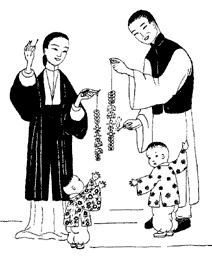Qingming Festival
Qingming Festival (Lua error in package.lua at line 80: module 'strict' not found.
), also known as Tomb-Sweeping Day or Pure Brightness Festival, is a traditional Chinese festival observed by the Han Chinese and several other East Asian cultures. The festival falls on the first day of the fifth solar term of the traditional Chinese lunisolar calendar. This date is usually around April 4th or 5th of the Gregorian calendar.
History[edit | edit source]
The Qingming Festival has a history of over 2,500 years. It originated from the Cold Food Festival (寒食节), which commemorated Jie Zitui, a loyal follower of Duke Wen of Jin during the Spring and Autumn period. The festival was later combined with the practice of tomb sweeping and ancestor worship, becoming the Qingming Festival as it is known today.
Customs[edit | edit source]
During the Qingming Festival, people visit the graves of their ancestors to clean the tombstones, offer food, tea, wine, and other libations, and burn joss paper. These activities are meant to show respect to the deceased and ensure their comfort in the afterlife.
Other customs include:
- **Spring Outing (踏青)**: Families often take advantage of the holiday to enjoy the spring weather and go on outings.
- **Flying Kites (放风筝)**: Kite flying is a popular activity during Qingming, symbolizing the release of bad luck and the welcoming of good fortune.
- **Planting Trees (植树)**: Qingming is also associated with the practice of planting trees, which is why it is sometimes referred to as Arbor Day in China.
Cultural Significance[edit | edit source]
Qingming Festival is a time for Chinese people to honor their ancestors and reflect on their heritage. It is a day of both remembrance and renewal, blending solemnity with the joy of spring.
Related Festivals[edit | edit source]
See Also[edit | edit source]
References[edit | edit source]
External Links[edit | edit source]
Search WikiMD
Ad.Tired of being Overweight? Try W8MD's NYC physician weight loss.
Semaglutide (Ozempic / Wegovy and Tirzepatide (Mounjaro / Zepbound) available. Call 718 946 5500.
Advertise on WikiMD
|
WikiMD's Wellness Encyclopedia |
| Let Food Be Thy Medicine Medicine Thy Food - Hippocrates |
Translate this page: - East Asian
中文,
日本,
한국어,
South Asian
हिन्दी,
தமிழ்,
తెలుగు,
Urdu,
ಕನ್ನಡ,
Southeast Asian
Indonesian,
Vietnamese,
Thai,
မြန်မာဘာသာ,
বাংলা
European
español,
Deutsch,
français,
Greek,
português do Brasil,
polski,
română,
русский,
Nederlands,
norsk,
svenska,
suomi,
Italian
Middle Eastern & African
عربى,
Turkish,
Persian,
Hebrew,
Afrikaans,
isiZulu,
Kiswahili,
Other
Bulgarian,
Hungarian,
Czech,
Swedish,
മലയാളം,
मराठी,
ਪੰਜਾਬੀ,
ગુજરાતી,
Portuguese,
Ukrainian
Medical Disclaimer: WikiMD is not a substitute for professional medical advice. The information on WikiMD is provided as an information resource only, may be incorrect, outdated or misleading, and is not to be used or relied on for any diagnostic or treatment purposes. Please consult your health care provider before making any healthcare decisions or for guidance about a specific medical condition. WikiMD expressly disclaims responsibility, and shall have no liability, for any damages, loss, injury, or liability whatsoever suffered as a result of your reliance on the information contained in this site. By visiting this site you agree to the foregoing terms and conditions, which may from time to time be changed or supplemented by WikiMD. If you do not agree to the foregoing terms and conditions, you should not enter or use this site. See full disclaimer.
Credits:Most images are courtesy of Wikimedia commons, and templates, categories Wikipedia, licensed under CC BY SA or similar.
Contributors: Prab R. Tumpati, MD





